Pace 1984 - Study guides, Revision notes & Summaries
Looking for the best study guides, study notes and summaries about Pace 1984? On this page you'll find 56 study documents about Pace 1984.
All 56 results
Sort by
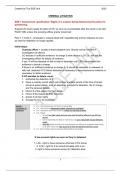
-
SQE 1 Criminal Litigation
- Summary • 34 pages • 2023
-
- £8.97
- 2x sold
- + learn more
Introducing Criminal Litigation notes from The SQE Hub specifically tailored by addressing each of the assessment specifications listed on the SRA website. These high yield notes are an amazing revision aid and address the following: - Rights of a suspect being detained by the police for questioning; - Identification procedures; - Advising a client, including vulnerable clients, whether to answer police questions; - Procedure for interviewing a suspect under PACE 1984; - Bail application...

-
Knowledge check revision - Powers of Arrest Questions With Complete Solutions
- Exam (elaborations) • 11 pages • 2024
-
- £11.83
- + learn more
Knowledge check revision - Powers of Arrest Questions With Complete Solutions Where does the Power of Arrest come from? Code G Section 24 of PACE 1984 Where does the Power of Arrest given to any person? Code G Section 24A of Pace 1984 Where does the Search Upon Arrest power come from? Code G Section 32 of PACE 1984 Where does the power to Further Arrest come from? Code G Section 31 of PACE 1984 Where does the power to De-Arrest come from? Code G Section 30 of PACE 1984 What does PACE stat...

-
PACE Question and answers 100% correct
- Exam (elaborations) • 5 pages • 2024
- Available in package deal
-
- £11.01
- + learn more
PACE Question and answers 100% correct What does PACE stand for and what year the act was introduced? - correct answer Police and Criminal Evidence Act 1984 What does PACE do? - correct answer Sets out police powers such as the right to stop, search, arrest, interview and take samples from suspects. Set out with eight codes of practice What does section 1 of PACE give right to? - correct answer Gives the police the right to stop and search people and vehicles in a public place Def...
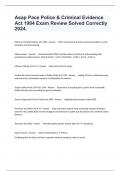
-
Asap Pace Police & Criminal Evidence Act 1984 Exam Review Solved Correctly 2024.
- Exam (elaborations) • 7 pages • 2024
-
- £6.52
- + learn more
Police & Criminal Evidence Act 1984 - Answer Strict rules governing stop & search procedures, arrest, detention and interviewing. Police powers - Answer Contained within PACE and the codes of practice. 8 codes dealing with procedures & police powers. Stop & Search - code A. Detention - Code C. Arrest - Code G. Misuse of Drugs Act 1971 - Answer Stop and search for drugs. Section 60 of the Criminal Justice & Public Order Act 1994 - Answer Lasting 24 hours. Authorised stop ...
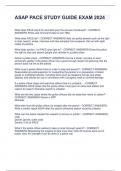
-
ASAP PACE STUDY GUIDE EXAM 2024
- Exam (elaborations) • 3 pages • 2024
- Available in package deal
-
- £9.79
- + learn more
ASAP PACE STUDY GUIDE EXAM 2024 What does PACE stand for and what year the act was introduced? - CORRECT ANSWERS-Police and Criminal Evidence Act 1984 What does PACE do? - CORRECT ANSWERS-Sets out police powers such as the right to stop, search, arrest, interview and take samples from suspects. Set out with eight codes of practice What does section 1 of PACE give right to? - CORRECT ANSWERS-Gives the police the right to stop and search people and vehicles in a public place Define a p...

-
PACE Study Guide Exam Questions Well Answered Rated A+ 2024.
- Exam (elaborations) • 3 pages • 2024
-
- £8.15
- + learn more
What does PACE stand for and what year the act was introduced? - Answer Police and Criminal Evidence Act 1984 What does PACE do? - Answer Sets out police powers such as the right to stop, search, arrest, interview and take samples from suspects. Set out with eight codes of practice What does section 1 of PACE give right to? - Answer Gives the police the right to stop and search people and vehicles in a public place Define a public place - Answer Can be a street, car park or ...
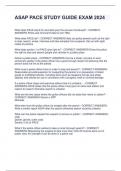
-
ASAP PACE STUDY GUIDE EXAM 2024
- Exam (elaborations) • 3 pages • 2024
- Available in package deal
-
- £10.60
- + learn more
ASAP PACE STUDY GUIDE EXAM 2024 What does PACE stand for and what year the act was introduced? - CORRECT ANSWERS-Police and Criminal Evidence Act 1984 What does PACE do? - CORRECT ANSWERS-Sets out police powers such as the right to stop, search, arrest, interview and take samples from suspects. Set out with eight codes of practice What does section 1 of PACE give right to? - CORRECT ANSWERS-Gives the police the right to stop and search people and vehicles in a public place Define a p...
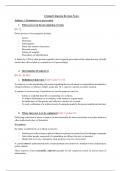
-
Criminal Litigation - Preliminaries to Prosecution
- Summary • 11 pages • 2024
- Available in package deal
-
- £10.96
- + learn more
Criminal Litigation - Preliminaries to Prosecution The Codes of Practice issued under the Police and Criminal Evidence Act 1984 (PACE) and their importance to criminal investigations 2. The provisions of Code C.10 (cautions and special warnings) and Code C.11 (interviews) 3. The main powers of arrest and the detention and treatment of suspects 4. The role of the Crown Prosecution Service and other prosecutors 5. The different methods of commencing criminal proceedings and time limits
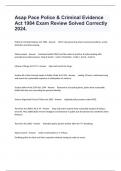
-
Asap Pace Police & Criminal Evidence Act 1984 Exam Review Solved Correctly A+ 2024.
- Exam (elaborations) • 7 pages • 2024
- Available in package deal
-
- £6.52
- + learn more
Police & Criminal Evidence Act 1984 - Answer Strict rules governing stop & search procedures, arrest, detention and interviewing. Police powers - Answer Contained within PACE and the codes of practice. 8 codes dealing with procedures & police powers. Stop & Search - code A. Detention - Code C. Arrest - Code G. Misuse of Drugs Act 1971 - Answer Stop and search for drugs. Section 60 of the Criminal Justice & Public Order Act 1994 - Answer Lasting 24 hours. Authorised stop ...

-
police powers- powers of arrest and search questions with correct answers
- Exam (elaborations) • 5 pages • 2023
- Available in package deal
-
- £11.01
- + learn more
What articles of ECHR might police powers restrict - Answer · Article 5 ECHR (right to liberty) and article ECHER (right to fair trial) and potentially Article 8 (right to private life) What code of PACE 1984 is powers of arrest covered by - Answer Code G Who issues arrest warrants? - Answer Magistrates court What act states that the grounds for making an arrest are that a constable has reasonable grounds to believe that person is committing, has committed or is about to commit a...

Do you wonder why so many students wear nice clothes, have money to spare and enjoy tons of free time? Well, they sell on Stuvia! Imagine your study notes being downloaded a dozen times for £15 each. Every. Single. Day. Discover all about earning on Stuvia


